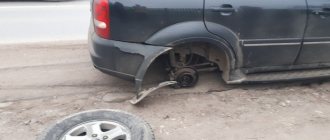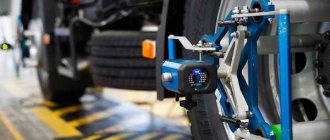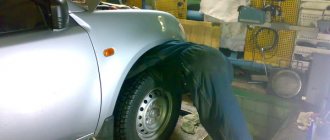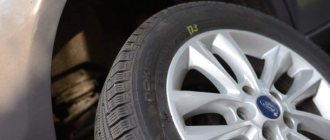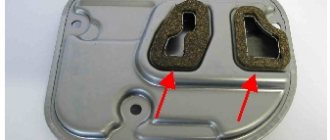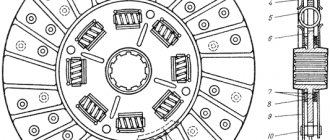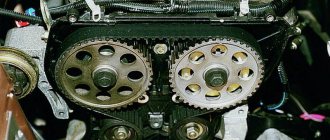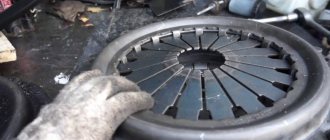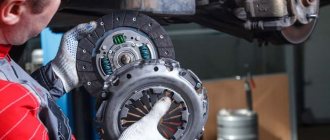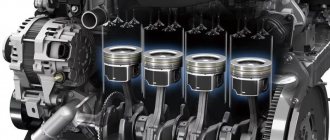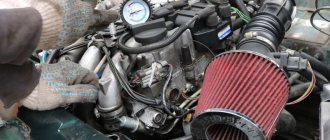A car's brake system without defects is the key to safe driving. The driver must be sure that when he presses the brake pedal, the car will start to stop with a certain intensity. Braking efficiency depends on a number of factors, but it cannot be achieved if there are defects in the brake system components.
Experienced drivers know the importance of timely replacement of pads and brake discs. But there is another problem that you may encounter: caliper knocking. If the calipers are knocking, it is necessary to identify the cause of the malfunction and eliminate it so that the brakes do not fail when the car is moving.
How to tell if your calipers are knocking
Knocking calipers is a common problem for many cars, and in some car models it can be called a “birth disease.” For example, in a number of Chevrolet cars, the calipers begin to knock up to 30 thousand kilometers, and this malfunction is associated with the guides.
Determining that the calipers are knocking is quite simple. The tapping sound of the caliper is best heard when the car is moving at low speed, and especially when passing obstacles. That is, in order to hear it, it is recommended to listen to the car’s suspension when driving over a speed bump or when driving on a dirt road. When you press the brake the knocking noise disappears.
It is worth noting that in most cases, caliper knocking is not a problem that is covered by the vehicle manufacturer's warranty. Accordingly, the driver has to solve the problem for a fee at a service center or independently.
Guides
The caliper is constantly subject to quite heavy loads. Therefore, problems with them are not uncommon. And on some Chevrolet models, this is a generic disease that appears after 20,000-30,000 kilometers. There are several ways to fix this problem:
What to do if the calipers are knocking
When faced with the problem of caliper knocking, you must first carry out diagnostics and determine the cause of the malfunction.
Heavy pad wear
The first thing you need to check if you suspect a knocking caliper is the pads. They can be diagnosed in two ways:
- In move. If, while driving, the car began to brake worse, with the same pressure on the pedal, and characteristic squeaks appeared when braking, this indicates severe wear of the pads. This is also indicated by the pedal beating when braking;
- Visually. After examining the pads, you need to determine whether the lining on them has worn down to metal or not yet. If worn out or the situation is close to this, the pads need to be replaced.
How to get rid of knocking calipers on front-wheel drive LADAs
Owners of cars of different brands encounter extraneous noise from brake calipers, and LADA is no exception. Most often, drivers of Grant/Kalina, Largus and Vesta encounter this problem. The malfunction is less common on Priora and XRAY. Let's consider what can be done in this case.
To make sure that extraneous noise while driving comes specifically from the brake mechanisms, you need to rock the caliper from side to side (you can do this without removing the wheel):
Front wheel brake diagram:
1 – wheel cylinder; 2 – fitting for bleeding the brake drive; 3 – sealing ring; 4 – piston; 5 – protective cap; 6 – retaining ring; 7 – caliper; 8 – pad guide; 9 – brake pads; 10 – protective cover; 11 – guide pin; 12 – guide pin fastening bolt; 13 – brake hose; 14 – bolt securing the cylinder to the caliper.
The sounds may resemble metallic knocking, rumble, clanging, strumming, etc. The first step is to contact your dealer with the problem. As far as we know, there are no AvtoVAZ regulations in this case. If the official representative refuses, you can try to get rid of the knocking of the calipers yourself using one of the suggested methods:
1. Fill the guide pins with refractory grease (it’s called “Grease for calipers”).
2. Replace the caliper guide pins with new ones.
3. Make a small groove in the guide fingers (using a lathe), onto which we put a ring made of oil-gasoline-resistant and heat-resistant rubber.
4. Make new guides (using a lathe), which will be slightly larger in diameter than the old ones.
5. Replace brake pads. It is better to choose ones that have a special rubberized coating on their outer side (survey for Vesta, Largus, Granta/Kalina/Priora).
6. Tighten the brake pad guide using a plastic clamp or spring (can be done without removing the wheel).
7. Fold the top of the noise reduction plate (number 4) down. This will get rid of the rattling of the calipers on Vesta:
This method is also shown in the video:
Information letter No. 19-18: When contacting owners of Lada Vesta cars, the effect of “noise from the brakes of the front wheels” emitted when driving on roads with broken surfaces is functional and cannot be eliminated under the warranty obligations of AvtoVAZ PJSC.
Have you encountered rattling noise from the calipers on your LADA? Did the official dealer help in this situation or did you have to fix it yourself? Let us remind you that knocking noises in the front part of the car can come from the suspension (for example, on Vesta from the anti-roll bar) or from the engine mount.
Development on the steering knuckle
Front and rear disc brakes squeal their pads very often due to wear on the steering knuckles. As a result of prolonged use, the metal is “eaten” at the point of contact with the supporting plate. Upon visual inspection, small grooves may be found on the knuckle, which are signs of wear.
Initially, an extraneous sound appears on bumps, but subsequently it can accompany the entire period of movement of the car. When contacting a service technician with a question about what to do with a worn steering knuckle, the car owner receives two standard ways to solve the problem:
- Using welding, weld metal onto the worn surface.
- Replace the fist.
Both of these methods are very often unacceptable for car owners, as they are very expensive. There are artisanal ways to solve the problem. One of the cheapest and simplest methods is given below. It only requires plastic clamps.
- Clean the protrusions on the fist.
- Tighten the plastic tie. Do similar actions for the remaining protrusions.
- Trim off excess.
Since plastic ties do not have high strength, they need to be updated 1-2 times a year. For a longer lasting solution to the problem, it is recommended to use metal. You can fasten it, for example, as shown in the photo below.
Problems with pads
To identify the reason why the brakes rattle, you should check the pads. A visual inspection may reveal that:
- counterfeit products;
- consumables are completely worn out;
- unsuitable pads are installed, for example, from another vehicle.
The most common noise in the caliper is fake. The main causes of knocking are shown in the table below.
Table - Origin of knocking noise from counterfeit pads
| Reason for knocking | Note |
| Delamination of friction material and support lining | Occurs when the manufacturer uses an adhesive mixture with poor adhesion. |
| Friction lining melting | Friction material particles stick to the disc, causing vibration and knocking as it rotates. |
| Baseplate geometry mismatch | There is a loose fit and uneven distribution of braking forces |
| Incorrect pad dimensions | There is a possibility of play in the seat |
Fake pads after 2500 km
If problems arise with the pads, they need to be replaced. In some cases, it is possible to modify the consumable, for example, if the geometry or dimensions differ from the required ones.
In this case, car owners are advised to remove excess parts of the friction material using a file. This should only be done as a last resort, since tampering with the braking system reduces road safety and violates the law.
Discs
Failed discs can also cause pads to knock. As a result of intense braking, the metal heats up. When driving through a puddle, water entering leads to deformations. Disc beating occurs. In this case, the knocking of the pads directly depends on the speed of the car. Elimination of runout is possible by boring, but provided that the deformation is not significant and the thickness of the disk is sufficient. Otherwise, it needs to be replaced.
The use of low-quality discs leads to their delamination. This causes damage to the pads and their knocking. The problem can be fixed only by replacing the disks with high-quality ones.
Possible reasons
To repair a fault, it must be found. Therefore, first we will look at the main causes of caliper knocking:
- Worn pads. Actually, it is not the caliper that is knocking, but the pads;
- The guides were taken out, as a result the caliper moves along them, while it knocks;
- The bolts holding the caliper have come loose.
Each of these problems has its own methods and repair methods. Let's look at them in more detail.
Build error
If the pads begin to rattle after overhauling the brake system or replacing them, this may indicate an error occurred during installation work. At the same time, one should not exclude the risk of installing low-quality consumables, which cause extraneous sounds.
The most common error during assembly is poor fixation of the inner pad by the petals in the piston. In this case, you need to get it out by disassembling the caliper. Next, you should bend the petals further and mount everything in place.
What other components of the car should we look for the cause?
For those who are interested in what to do when rattling and other noises appear, the following instructions for action will be useful:
- Inspect and evaluate the condition of the brake pads by eye. Pay special attention to pads that have worn out more than half.
- Specifically find a bulge on the road, for example, any bump, and press the brake pedal. If after this the sound disappears, you can make a diagnosis - the problem lies in a faulty caliper.
- To get rid of the last doubts, it is better to dismantle the wheel. The caliper itself is rocked across its position and the size of the play is assessed. It should be no more than 1-1.5 millimeters.
Any calipers operate on brake fluid, which means there is a possibility of a leak. Most often, seals or protective anthers suffer from this. Dirt and water penetrate through worn boots onto the caliper and corrosion processes begin. A leak may appear in the rubber hose connecting the caliper to the brake line.
When you turn the steering wheel, the position of the caliper changes, and with it the position of the brake hose. Due to bending and temperature changes, rubber cracks and subsequently leaks. The fitting used to bleed the system may also fail. Because of this, it becomes airy and the pressure drops. The brake pedal either fails or reacts worse to pressure. All this reduces braking efficiency and road safety.
Getting rid of brake caliper knock using a spring
You can get rid of a leak in the caliper by timely checking this unit for the appearance of foreign stains. They are characterized by another “illness” - the so-called souring of the pistons. Rust gradually eats away at it and prevents it from moving freely in the nest. In practice, this immediately leads to the car moving to the side when braking. The sensitivity of the pedal is impaired, and the disc and pads begin to wear unevenly. This is why it is so important to inspect the condition of the anthers.
Front and rear calipers can break and knock with approximately the same probability. Souring of pistons, leakage of seals and clogged boots are typical for each of the car’s axles. In this case, the load on the front brakes occurs more often, so the operation of their components can occur faster. The rear ones can fail due to the handbrake mechanism located in their pistons.
The life and health of the driver, his passengers, and other road users largely depend on the efficiency and serviceability of the braking system. The caliper, as one of its elements, requires regular checking of its condition. The driver must pay attention to any creaks and other extraneous noises and respond to them in a timely manner.
Drum brake pads
Drum pads knock much less often. In most cases, the problem is due to excessive stretching of the springs of the mechanism. Elimination of chatter is carried out by rebuilding the drum brake. To do this, you must first purchase a special repair kit.
If knocking occurs immediately after replacing the drum pads, this indicates their low quality. The contact of friction material from a collapsing consumable on the drum leads to contamination of its surface, which causes impacts on the pads and their clanking.
Post by optimist » April 21, 2012, 6:41 pm
Good afternoon Please tell me what can cause the brake pads to rattle on bumps and how to cure it? Brief background. We changed the front brake pads and at first everything was fine, but after driving several thousand km. I noticed that there was some extraneous noise when driving over various bumps, but when I pressed the brake the noise disappeared. The noise that appeared was quiet, but the more I drive, the stronger it becomes, now it feels like not a car, but a bucket of bolts is moving. Help me find a solution to this problem.
UPD I found the reason why the pads were rattling.
The inner pad was poorly fixed by the petals in the piston, I took it out, bent the petals more, put them in place and now I enjoy normal driving without extraneous knocks. At the same time I changed the springs for prevention. Thanks everyone for the advice
Inspection of calipers
In 40 percent of cases, the front caliper rattles due to dry lubricant. Many car owners do not know that this part requires periodic maintenance. How often should you do it? Experts give the answer - lubrication is carried out every time the pads are replaced. The service life of the latter can range from 20 to 60 thousand kilometers, depending on the location (front or rear), as well as the driver’s driving style.
How to perform an audit? First you need to find a quality lubricant. It must be specialized - specifically for guides. Reviews do not recommend using grease for hubs, as well as copper and ceramic analogues. They dry out quickly and are not suitable for use in this location. A popular manufacturer of specialized lubricants for calipers is Liquid Moly. Typically this product is sold in vacuum bags. One is enough for two guides. The lubricant does not lose its properties at temperatures up to 200 degrees Celsius.
Note! If the piston boot is damaged, it must be replaced immediately. Otherwise, the rear and front calipers will rattle constantly.
The same work must be done on the adjacent brake mechanism. In order not to run to the store when you discover a damaged boot, it is recommended to purchase a repair kit in advance (in extreme cases, it will remain “in reserve”).
